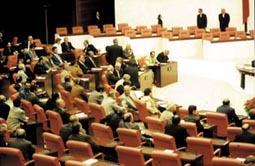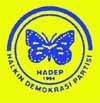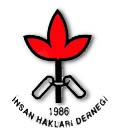22
November 2001
![]()
2. “Under pressure, Turk legislators back down on salary raise”, Turkish parliamentarians passed a constitutional amendment on Wednesday limiting salary and pension increases for themselves, under pressure from the country's president and public.
3. „Torture to HADEP members in
Silopi”, HADEP members, arrested on the last Friday in
Silopi district of Sirnak province were tortured under detention.
4. "Human Rights report of IHD
– IHD Chairman Ondul: “762 People met torture and humiliating
treatments in the first nine month of 2001”, Human Rights
Association (IHD) Chairman Husnu Ondul defended on Wednesday that 762
people met with torture and humiliating treatment in the first nine
months of this year.
5. „Turkey, Britain set for talks on EU force deadlock”,
Britain will hold fresh talks next week with Turkey to try to persuade
the NATO member to let a planned EU rapid-reaction force have automatic
access to alliance facilities and information, officials said on Tuesday.
6. “Brussels refuses to be blackmailed by Turkey”, Ankara’s self-confidence in foreign affairs has increased substantially since 11 September. As a result, the EU’s foreign ministers were unable yesterday as well to reach an understanding with Turkey regarding the EU intervention force. The time schedule for the creation of the force, however, will not be altered.
1.– AFP – „Turkish Parliament to hold closed session on Cyprus on Friday”:
ANKARA 
The Turkish parliament will hold a closed session on Cyprus on Friday,
when ministers will give confidential information on the dispute before
talks resume on the divided island, officials said Wednesday.
The session was decided at a meeting of the advisory board which draws up the parliament's working schedule, upon a written request from independent MP Mehmet Ali Irtemcelik and colleagues, the parliamentary officials said. Irtemcelik said the closed-door session was necessary for the government to explain its stance and planned steps at a time when internationally-recognized Greek Cyprus is expected to become a full member of the European Union by 2004.
Cyprus's accession to the EU before a political settlement remains a thorny question as it would entail the admission of a divided country, part of which is occupied by another candidate, Turkey. Closed sessions in the Turkish parliament are rare. No spectators or reporters are allowed in and deaf and mute clerks are on duty to ensure that the confidential information provided by the government does not leak out. Various MPs have called for such a session following harsh warnings from Turkey of annexation of the Turkish-held north and even war if the Greek Cypriot government takes the island into the EU without a political settlement first.
Turkey invaded and occupied the northern third of Cyprus in response to an Athens-engineered coup in Nicosia seeking to unite the island with Greece. The occupied area was subsequently declared the Turkish Republic of Northern Cyprus (TRNC), which is only recognised by Ankara. Its leader, Rauf Denktash, is scheduled to meet face-to-face on December 4 with Cypriot President Glafcos Clerides, for the first time in four years, to explore ways of resolving the island's division.
Denktash has insisted on recognition for his TRNC in a
confederal set-up. The Greek Cypriots, backed by the United Nations,
are only willing to grant the north federal status. ![]()
2. – AFP – “Under pressure, Turk legislators back down on salary raise”:
ANKARA 
Turkish parliamentarians passed a constitutional amendment on Wednesday
limiting salary and pension increases for themselves, under pressure
from the country's president and public. President Ahmet Necdet Sezer
last month declined to approve the original amendment, which would have
paved the way for significant hikes in the deputies' salaries and pensions,
and decided to have the public vote on the bill in a referendum.
The amendment, passed overwhelmingly to avoid an almost
certain referendum defeat when the popularity of all political parties
has nosedived, limits the amount of salary and pension increases of
legislators. The original change was squeezed into a package of constitutional
amendments aimed at bringing Turkey closer to the European Union's standards
of democracy and human rights in a bid to boost the country's membership
prospects. Sezer, who has been quite popular since taking office in
2000, had approved all provisions, except for the one related to the
legislator salaries. ![]()
3. – Kurdish Observer – „Torture to HADEP members in Silopi”:
HADEP members, arrested on the last Friday in Silopi district of Sirnak province were tortured under detention.
MHA /SIRNAK 
Lawyer Oktay Bahadir filed a complaint to the prosecution office,
saying that there were torture signs on the body of Aslan Kaya, member
of HADEP Youth Wings.
A delegation consisting of Murat Ceylan, HADEP Batman Provincial Chairman, and Lawyer Oktay Baharid went to Silopi the other day. Meeting with Hasan Ilten, Batman provincial administrator, Eyup Tanis, Silopi district secretary, and members of Youth Wings in Silopi Prison, Lawyer Bahadir stated that his clients were tortured heavily.
Noting that there were torture signs especially on both ankles of Aslan Kaya, Bahadir said the following: “We asked for our clients to be sent to a hospital. And we filed a complaint to the Public Prosecution Office.”
Bahadir added that their file on objection to the arrest
was being studied, saying “We expect that the court will make a
decision on the objection file in a short while.” ![]()
4. – Anadolu Agency – „Human Rights
report of IHD – IHD Chairman Ondul: “762 People met torture
and humiliating treatments in the first nine month of 2001”:
ANKARA
Human Rights Association (IHD) Chairman Husnu Ondul defended on
Wednesday that 762 people met with torture and humiliating treatment
in the first nine months of this year.
Ondul, who held a news conference in IHD Headquarters, briefed about the human rights report which they prepared in connection with the first nine months of this year.
Ondul said evaluation of the European Union Commission stating that a betterment was not seen in human rights report of Turkey, was an objective evaluation despite the deficiencies, not a text full of prejudices. He defended that there was an increase in torture and violation of freedom of expression.
Claiming that torture still could not be prevented in Turkey, Ondul said 472 people in the first nine months of 1999, 508 people in 2000, and 762 people met with torture and humiliating treatment in the first nine months of the year 2001.
Ondul pointed out that amendment to Article 34 of the Constitution was a positive development.
Stressing that amendment to Article 34 of the Constitution
was a positive development, Ondul said, ''however, addition of the word
'activity' instead of the world 'action' in Article 14 pertaining to
freedom of expression in the Constitution does not point out a betterment
in this field. Thus, it is not possible to mention an agreement to the
Article 10 of the European Convention on Human Rights.' ![]()
5. – Reuters – „Turkey, Britain set
for talks on EU force deadlock”:
BRUSSELS / by John Chalmers 
Britain will hold fresh talks next week with Turkey to try to persuade
the NATO member to let a planned EU rapid-reaction force have automatic
access to alliance facilities and information, officials said on Tuesday.
The negotiations in Ankara on November 26 come at a crucial time for the European Union, which wants to declare the first elements of its embryonic security and defence policy operational at a summit in mid-December.
Turkish Defence Minister Sabahattin Cakmakoglu told a news conference in Brussels that Ankara was adopting a flexible and imaginative stance ahead of the meeting, but he was non-committal on its outcome.
"Until we agree on everything, we agree on nothing," he said.
Other non-EU members of the Western alliance are in favour of granting free access to the EU force, which Washington backs.
But Turkey, which is not a member of the EU, says the European force envisaged cannot have automatic access to alliance planning, equipment and facilities unless Ankara has a direct say in decision-making.
The EU says this would be tantamount to letting Turkey veto missions of its 60,000-strong crisis management force, which is due to be fully operational -- ready to be deployed within 60 days in and around Europe -- by mid-2003.
Military planning
Turkey argues that 11 of NATO's 17 threat scenarios are in its area,
giving it special security responsibility and making its involvement
in case-by-case decision-making on the use of alliance assets by the
EU indispensable.
Diplomats said Turkey also fears that an EU military force could be used against its interests, for example in Cyprus.
If there was no agreement with Ankara -- which has a veto since all NATO decisions must be taken by consensus -- the Europeans could be forced to develop a parallel military planning structure, duplicating costly NATO efforts.
This would put extra pressure on EU defence budgets and also undermine the political and military relationship that NATO sees for itself with the EU's emerging security and defence policy.
Britain, which with France was an architect of the EU military intervention force, has held two rounds of talks with Ankara in recent weeks and diplomats said there were signs of progress. The next talks will be at political director level.
"The process is ongoing and both sides have made clear that they would like to see a solution by Laeken," one said, referring to the EU summit in Laeken, Belgium, next month.
Officials said NATO heavyweight Washington, whose pressure is seen as crucial to end the impasse, will also be talking with Ankara next week.
Cakmakoglu was speaking after a meeting of non-EU NATO members in Brussels on the EU's plans for a force which could perform tasks ranging from disaster relief to evacuation, peacekeeping and small-scale intervention.
EU defence ministers met on Monday to consider progress
towards their goals for the force, concluding that key capability gaps
remained for risky missions such as separating warring parties and preventing
conflicts. ![]()
6. – TAZ – “Brussels refuses to be blackmailed by Turkey”:
Ankara’s self-confidence in foreign affairs has increased substantially since 11 September. As a result, the EU’s foreign ministers were unable yesterday as well to reach an understanding with Turkey regarding the EU intervention force. The time schedule for the creation of the force, however, will not be altered.
BRUSSELS / by Daniela Weingaertner / translated by
Kurdish Media 
Report cards were handed out in Brussels last week, and Turkey,
just as every other year, got the poorest marks. “Turkey does exhibit
the basic characteristics of a democratic system, yet many fundamental
issues, such as civilian control over the military, still await satisfactory
resolution” read the Progress Report of the EU Commission.
Even so, Ankara can still be quite satisfied with the harsh words out of Brussels. For they still demonstrate that Turkey if formally included among the candidate countries.
The report made it clear to the Turks that, before accession negotiations begin, as they have already long since begun with the other twelve candidates, reforms will have to be implemented in almost all areas of political life. Brussels also called for “concrete steps to facilitate a solution” on the Cyprus issue. Ankara should influence “Mr. Denktash” – a warning that showed its results a few days later. The Northern Cypriot leader agreed to a date for a meeting with Glafkos Klerides, the President of the Greek Cypriot portion of the island.
As long as the civilian control over the military cited
in the Progress Report cannot be achieved by the weak and feuding political
parties, however, Turkey will remain an uncertain candidate for the
EU. If need be,
Greek Cyprus, which as the star pupil got the best grades this time
as well in the Progress Report, will be taken into the Union even in
the absence of a prior resolution of the Cyprus dispute.
The politicians in Brussels also intend to take no notice of the sensitivities and neuroses of the military in Ankara in terms of the new EU intervention force. The defense ministers confirmed once again in their meeting on Monday that the time schedule will be adhered to: 60,000 troops are to be able to be mobilized within two months starting in the year 2003.
In order to be present in a crisis region with such a troop strength for a year, a pool of 100,000 soldiers is required, for which commitments have already been made by all the members of the Union. There are still problems in terms of strategic reconnaissance and transport. The EU would like to have recourse to NATO resources in case of emergency. Both politicians and experts consider it absurd to create a parallel structure.
These plans have been blocked for months by the Turkish military. There should be no change of the EU crisis force being deployed on Cyprus, and thus NATO equipment being used against NATO-member Turkey, is the Turkish rationale. Such nightmares encounter little sympathy in Brussels, however.
Guenter Verheugen, Commissioner for EU Expansion, considers a clause that would expressly exclude deployment on Cyprus to be possible. A right to join in the decision, however, such as Ankara would like to have in all deployments of the EU crisis force, is categorically refused in Brussels.
Since 11 September, Turkey considers itself indispensable as a western bulwark in a region of villains. Turkey is convinced that it has the U.S.
on its side as a powerful advocate. But self-confidence
in foreign affairs has also grown in the EU over the past few months.
In Brussels it is being said clearly that Turkey’s blackmail attempts
will not affect the schedule of things – either regarding Cyprus
or in the formation of the crisis force. ![]()